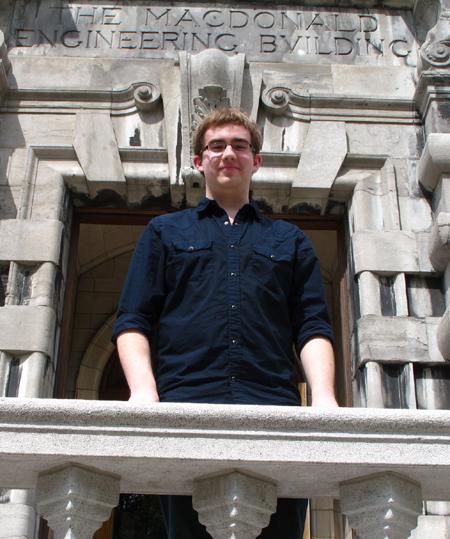If there’s one message Josh Redel wants to get across to his fellow engineering students, it’s that it’s good to be both gay and a successful engineer. It took some time for him to realize this himself, having grown up in Calgary and then in what he calls a “WASP-y” area outside Philadelphia. He came out while in his second year studying software engineering at McGill. Now four years into his undergraduate studies there, the 22-year-old is both the president of the Engineering Undergraduate Society and the founder of a social group called Queer Engineer.
After experiencing mild success in its inaugural year, Queer Engineer will return at the beginning of the 2011 fall semester with events Redel hopes will resonate with students and faculty members alike. He says getting the Queer Engineer name out early in the academic year is key to remaining in students’ peripheral vision all year long, especially since engineering students often have their noses buried deep in their books and have little time or reason for socializing. The challenge, he says, will be getting through to them in the first place.
Redel says gaining the interest and trust of students and faculty requires a certain amount of pussyfooting. The engineer stereotypes often ring true: studious, ethnically diverse but also conservative, mostly male, mostly hetero. So, many queer engineering students and professors are reluctant to out themselves by attending events specifically for gay engineers. Redel says, for example, that no engineering faculty members expressed interest in Queer Engineer, despite the group’s attempts to get their attention. Some members of other faculties are supportive.
“What’s the best way to reach out to faculty?” asks Redel. “You can’t just send an email out saying, ‘If you’re gay, get back to me!’”
Instead, Redel has found some success in the middle: organizing events for which there isn’t a perception that being gay is a requirement for attending. Queer Engineer hosted a wine and cheese that drew 80 to 90 people, Redel estimates. The group also hosted a well-received soirée last March at the engineering building’s Blues Pub, for which attendees were encouraged to don their most ridiculously bright and tight clothing. As a weekly event held by the Engineering Undergraduate Society every Friday evening, the Blues Pub was a good opportunity for Queer Engineer to reach out to gay students.
“The Blues Pub happens every Friday no matter who is the host, so you don’t have to identify as gay [to attend],” Redel says.
This coming year, the Queer Engineer committee hopes to hold an industry-related speaker series intended to show engineering students they can succeed in the engineering industry regardless of gender or sexual orientation. Another wine and cheese slated for September is in the works, too. Redel says Queer Engineer is not at all a political group but a social one he hopes will allow gay engineering students the opportunity to socialize and to feel comfortable in the industry they chose to pursue. “By having more events like this, you’re working it into their minds that this kind of thing is okay,” Redel says.


 Why you can trust Xtra
Why you can trust Xtra


